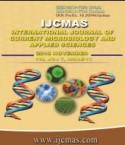


 National Academy of Agricultural Sciences (NAAS)
National Academy of Agricultural Sciences (NAAS)

|
PRINT ISSN : 2319-7692
Online ISSN : 2319-7706 Issues : 12 per year Publisher : Excellent Publishers Email : editorijcmas@gmail.com / submit@ijcmas.com Editor-in-chief: Dr.M.Prakash Index Copernicus ICV 2018: 95.39 NAAS RATING 2020: 5.38 |
Five red fleshed guava varieties viz., Arka Kiran, Lalit, H-17-16, Punjab Pink and Arka Rashmi were evaluated for their processing potential. The processed products viz., squash, RTS and Jelly were prepared from these 5 varieties and assessed for their quality during storage. The squash prepared from fruits of Punjab Pink retained maximum ascorbic acid (58.3 mg/100g) even after 90 days of storage (DAS). The RTS prepared from fruits of Arka Rashmi at 30 and 90 DAS retained maximum ascorbic acid (34.33 and 26.75 mg/100g). The jelly prepared from fruits of Lalit had retained maximum ascorbic acid of 19.71 and 15.67 mg/100 g at 30 and 90 DAS. While the lycopene retention was maximum in squash, RTS and Jelly prepared from fruits of Arka Kiran. With respect to organoleptic evaluation the overall acceptability was found to be maximum in squash and RTS prepared from fruits of variety H-17-16, whereas for jelly prepared from fruits of Arka Rashmi. The minimum microbial load (cfu/ml) at 90 DAS was observed in squash prepared from fruits of Arka Kiran and Arka Rashmi, in RTS prepared from Lalit and Arka Rashmi and in Jelly prepared from Arka Rashmiand Lalit.
 |
 |
 |
 |
 |